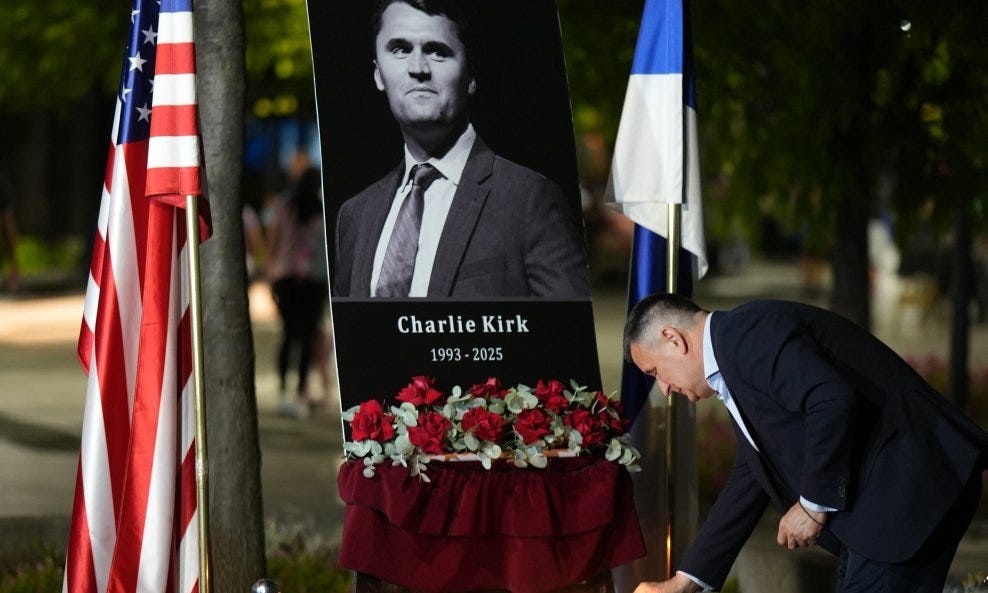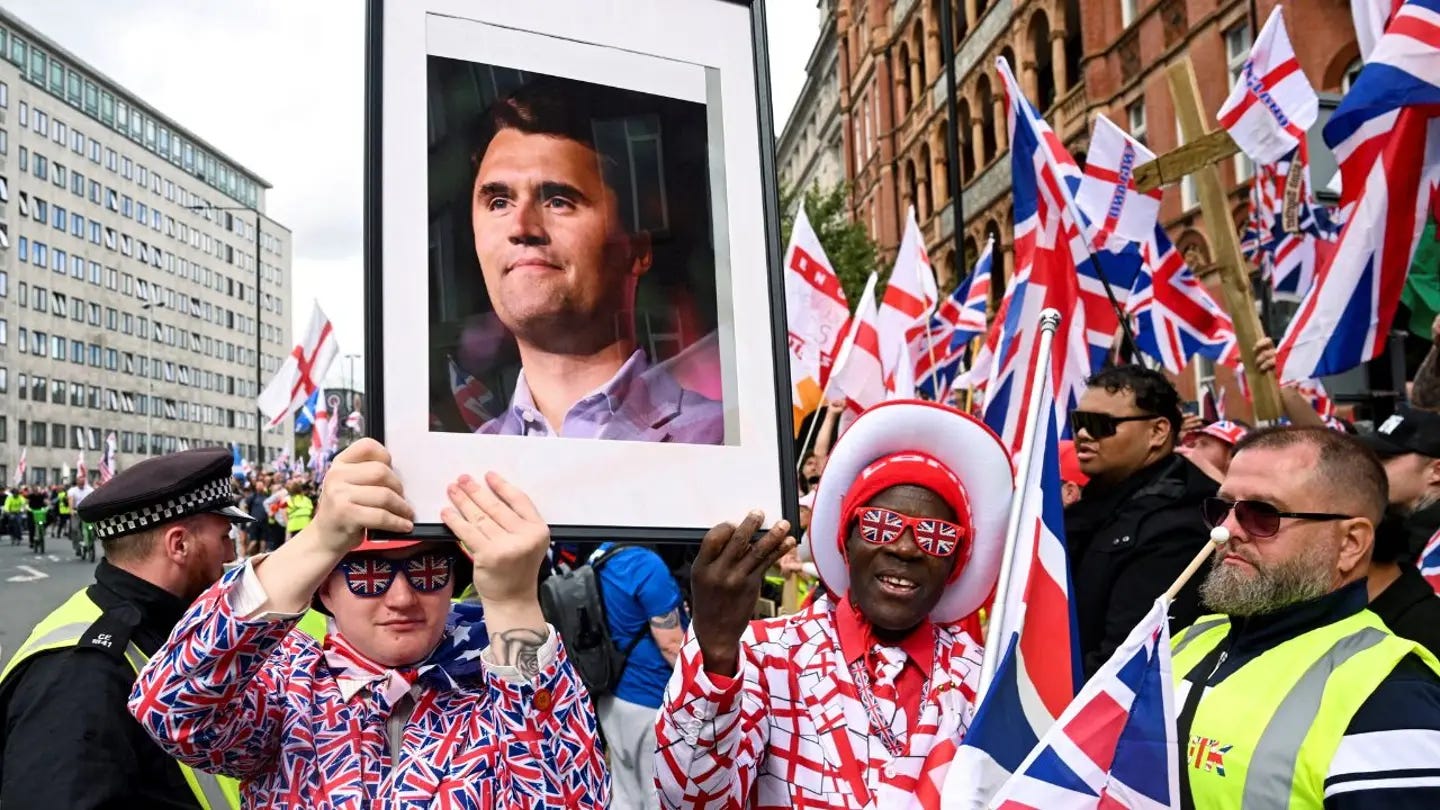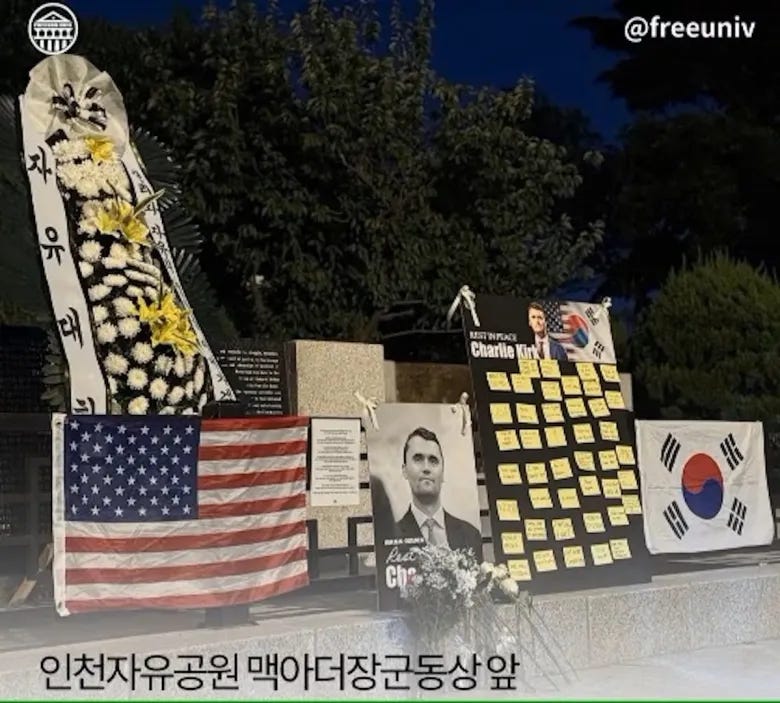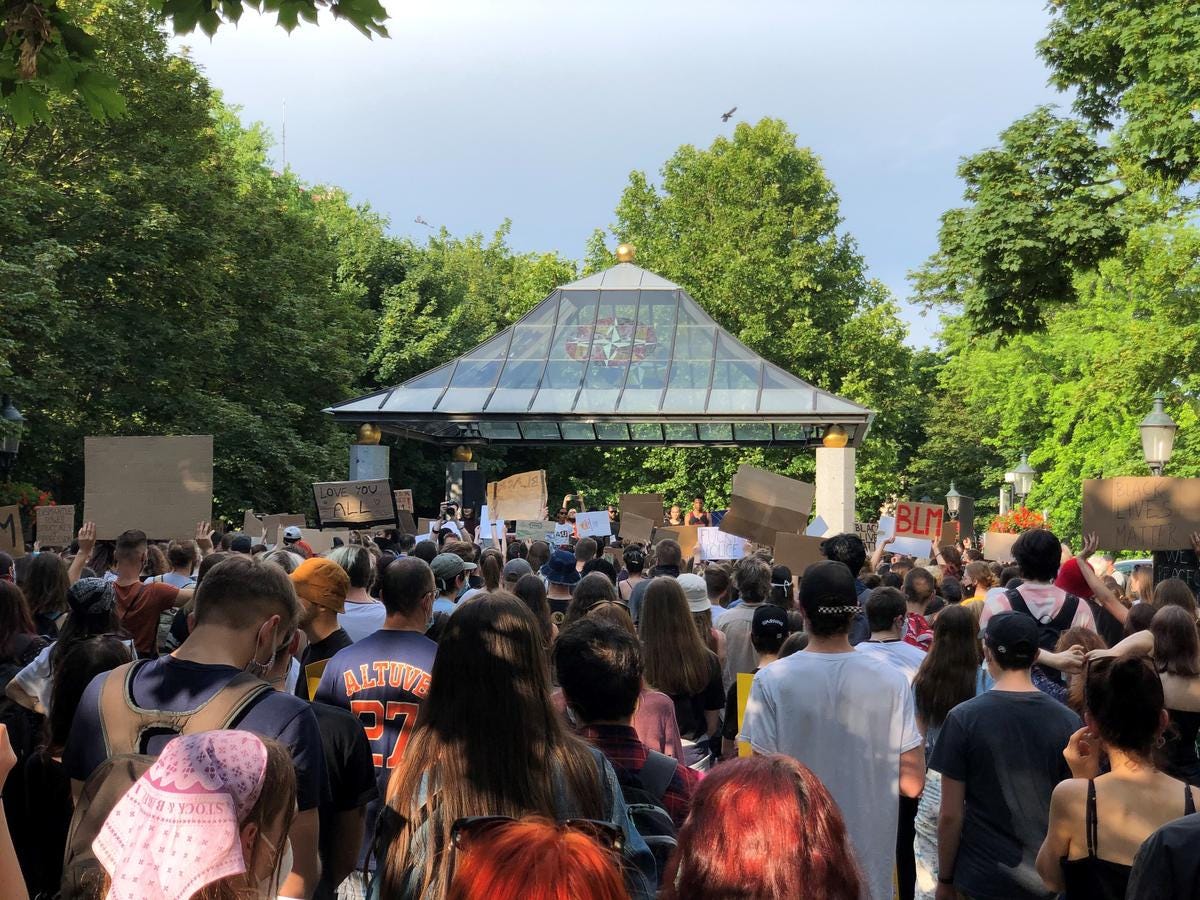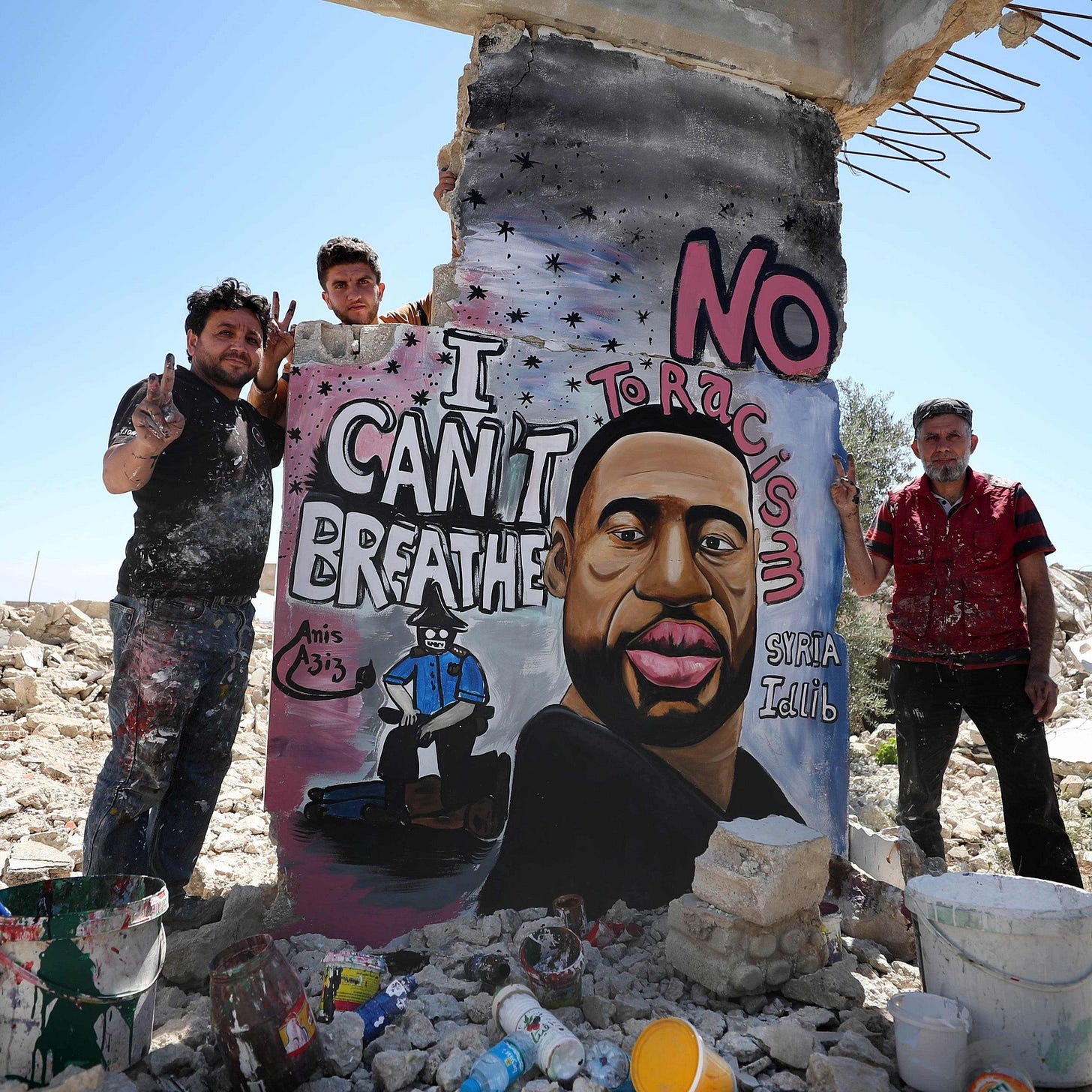The Charlie Kirk Assassination as an International Event
From Banja Luka to Seoul, the globalization of the American culture war continues apace.
Dear readers, I have some exciting news: I am relaunching my Substack with a new concept. It will be more akin to a regular newsletter with things I find newsworthy or interesting from the Balkans, Eastern Europe, Turkey, and the Black Sea region. There will also be occasional longer essays on general political culture and global events, with a view from the Balkans like this one.
Those who’ve been reading me for the past year or so will know that I have struggled with the question of whether or not to continue writing about the Balkans at all. I had gotten burnt out after years in the region and was hungry for something new. But I feel now that the best thing to do is both: to keep one foot planted in the Balkans and the other in new places, things, and ideas. So that is what we’ll do here. If you’re interested in my personal commentary and thoughts on “the Balkans and everything to their East” then I hope you’ll enjoy this project.
If you haven’t already, please consider becoming a paid subscriber.
Earlier this month, beleaguered Bosnian Serb leader Milorad Dodik posted photos of a shrine to Charlie Kirk in Banja Luka online. In them, a procession of prominent Bosnian Serbs are seen kneeling and lighting candles in his honor. That a Serbian politician sanctioned by the US Treasury would memorialize a martyr of the American culture war may be confusing for some. For his American supporters, Charlie Kirk was a thoroughly homegrown phenomenon: a Christian of the evangelical variety, a champion of the first and second amendments, and a firebrand of our country’s internecine campus politics. But his murder has also been an international event. Across the globe, mourners have gathered, candles have been lit, and Christ and country have been invoked in wildly incongruous contexts. Kirk’s contentious legacy has been celebrated and savaged in popular discourse and in media around the world, reinterpreted through national politics, and exploited for domestic and international political gain.
In Europe, the Serbs made the most noise, something that is noteworthy by itself given their reputation as the most anti-American nation on the continent. Dodik wrote on X that Charlie Kirk had been “a sincere friend of the Serbian people and an advocate for the common values of freedom and faith that connect us.” By aligning himself with Kirk, Dodik hoped to signal to the Trump White House that he was on their side. This was no mere friendly gesture. For Dodik, such signaling is a matter of political survival. The Bosnian Serb leader wants Trump to lift the sanctions placed on him by the outgoing Obama administration almost a decade ago. Towards this end, Dodik has repeatedly lambasted his “globalist” enemies, hoping to get the Trump administration’s attention and be taken up as a MAGA cause. So far, there haven’t been any takers. Indeed, one reason foreign leaders like Dodik are clinging to the American culture war lexicon is because they’ve found the administration difficult to reach through traditional channels.
Another leader who has struggled to connect with Trump is President Aleksandar Vucic in neighboring Serbia. After Kirk’s death he told the pro-government Informer TV that he had recently thwarted a near-identical attempt on his own life. “They set up a scene for me in which I would be Charlie Kirk,” he said. Vucic claimed that his political opponents had planned to invite him to participate in a Kirk-like “debate” on Belgrade’s Republic Square, which was really just a ruse: according to Vucic, he was to be offered to sit on a chair and then be shot dead “like Charlie Kirk”. As anyone familiar with Serbian politics is well aware, this story is highly suspect. The last time Vucic participated in a debate with any of his political opponents was more than 13 years ago, in May 2012. At the 80th session of the UN General Assembly, Vucic invoked Kirk again. “[Kirk] was savagely assassinated just because his killer did not like his ideas…He was shot even after death by the same ones who had prepared political and media grounds for his assassination.” It’s little wonder that Vucic has attached himself to Kirk: There is no theme that he loves more than martyrdom, particularly his own; detailed descriptions of likely fake assassination plots against him have become a staple of Serbian political discourse. By talking so much about Kirk, Vucic was hoping to feed parasitically off of his popularity, align himself publicly with MAGA, and paint himself as a victim of irrational, violent opponents, who in Serbia are the protesters who’ve been demonstrating against him for almost a year now. Like Dodik, Vucic has also found himself repeatedly ignored and iced out by the Trump administration; he has therefore been left to wave American culture war symbols around like smoke signals.
Meanwhile, ordinary Serbs have also championed Kirk since his death. A Charlie Kirk mural also appeared on a wall close to the Belgrade Waterfront project last week. (Kirk once said that he had played on a Serbian basketball team in Chicago, and that the other players gave him a Serbian nickname).
In London, Tommy Robinson managed to draw 110,000-150,000 people to the streets for a “Unite the Kingdom” protest. Though planned before Kirk’s murder, many participants told the media they felt galvanized by the assassination, which became the event’s central focus. The rally was billed as a “freedom of speech festival”, and most grievances centered around Britain’s controversial hate speech laws, which have led to an average of 33 arrests per day. Kirk, who is now viewed as a free speech martyr by his supporters, was never far from view. Protesters waved placards emblazoned with his face and lifted banners printed with his name. The requiem wasn’t confined to the streets. A Kensington pub rechristened itself The Trump Arms and opened a separate “Charlie Kirk debate room” dedicated to his memory. A number of smaller memorials have also been held in London in recent weeks.
South Koreans also mourned Kirk’s death in public. Memorials were organized by the conservative youth group Freedom Univ., established in January to support then-President Yoon Suk Yeol after he declared martial law. One makeshift shrine to Kirk was assembled in Seoul, and another was set up in Jahu Park (otherwise known as “Freedom Park”) in the city of Incheon, at the foot of a statue of General Douglass Macarthur. Right-wing groups also held marches for Kirk in Jamsil and Myeongdong. Kirk had brought his message to South Korea just days before his murder. In the country with the world’s lowest birth rate, Kirk’s invectives against feminism and the childless found a natural audience.
In South Africa, Kirk’s death was mourned by white Afrikaners, whom the Trump administration has championed as victims of an ongoing “genocide” by the black African majority. In the Afrikaner-only enclave of Orania, flags were flown at half-mast. And AfriForum Youth, an Afrikaner lobbying group, laid a wreath at the US embassy in Pretoria. The group’s spokesman, Louis Boshoff, described Kirk’s murder “a wake-up call that points to a global intolerance towards conservative thinking” and expressed sorrow about a world in which “a woke agenda is often imposed on young people.”
Some Black Africans paid tribute to Kirk as well. Ann Kioko, the Africa and UN campaign director of the conservative organization CitizenGo, praised Kirk’s opposition to abortion and “cultural imperialism”. CitizenGo, which operates on three continents, in 15 cities, and in 12 languages, was formed “to stop radical lobbies from imposing their agenda on society”. In the 21st century, liberalism is often viewed as the main ideological driver of cultural imperialism, supplanting the Christianity of prior centuries.
But no foreign country more inserted itself into the Kirk assassination story than Israel. Prime Minister Netanyahu appeared in successive clips praising Kirk and insisting that his country had nothing to do with the murder following allegations of Israeli involvement made by Candace Owens and some others in the alt-media sphere. More than anything, however, Israel seemed interested in depicting itself almost as an adjunct of Kirk. In doing so, the government of Israel hoped to ride the wave of public fury at the assassination, harnessing it to bolster its own position abroad. Kirk’s enemies were Israel’s enemies, Netanyahu’s message seemed to be, and if you were angry about the assassination, then you should redirect your anger at the enemies of Israel. The Israeli government’s response to the Kirk murder was a continuation of its broader propaganda strategy aimed at presenting itself as an icon of “anti-wokeness”, a bastion of Judeo-Christian normalcy in the face of “anti-Western” and “anti-White” sentiment being propagated by non-binary college students hellbent on “cancelling” anyone without pronouns in their email signature. If you were annoyed with those kinds of civilization-hating blue-haired freaks, Israeli propaganda goes, then you should support the state of Israel.
The frenzy of commemoration of Kirk and condemnation of the “radical left” recalled the international reaction to George Floyd’s death and subsequent Black Lives Matter protests in 2020. During that summer of discontent, countries around the world, from Kazakhstan to Slovakia, held protests in support of George Floyd. Murals of Floyd also started popping up in some unexpected places, from Syria’s Idlib province to Nairobi, Kenya. By importing American symbols of justice and anti-racism, people in distant countries could tout progressive politics while ignoring social dysfunction closer to home. For example, Slovakia’s BLM protests did not address racism against Roma, which is far more widespread in the central European country than racism and police brutality against Blacks. This reveals an unexpected truth: Another half decade into the culture war, the global right’s adoption of Kirk almost makes more sense than the international adoption of George Floyd. The specificity of the black experience in America is not generalizable across continents the way questions of freedom of speech are. The political debates around Kirk feel more global in 2025 than those around George Floyd did: questions of so-called traditional values, religion, immigration, and natality all are truly international today.
A few years ago, I remember watching a baffling Facebook live event hosted by the US Embassy in Belgrade. The event was about racism in the United States and had a whiff of faux radicalism about it. I remember thinking that it was an odd form of diplomacy. Usually diplomatic missions promote their country and emphasize its achievements; they do not fixate on its social ills. There was something grating about the event, because it revealed contradictions that I don’t think liberals have ever fully thought through. They have become defenders of the status quo and the institutions that prop it up, but at the same time want us to know that those very same institutions are built on structural racism and white supremacy. Suffice to say, it was not a winning formula, and still isn’t.
Meanwhile, our culture war will continue to give foreign politicians a tool for communicating with an unpredictable metropole. Leaders like Vucic and Dodik, who are trying to court the Trump White House but have discovered that it is a near impenetrable fortress, now signal allegiance to Washington DC by embracing Kirk and other American culture war icons and symbols. Even in a time of relative decline, the international virality of Kirk’s death, like that of George Floyd, confirms America’s still unrivaled place in the world.


